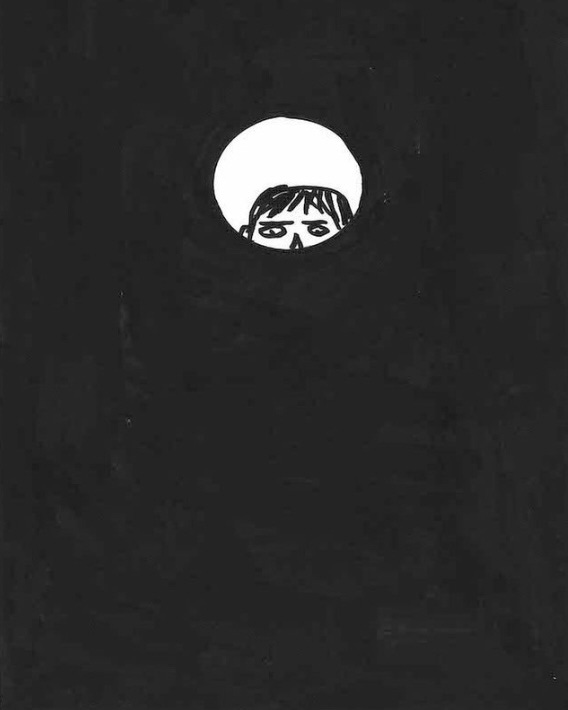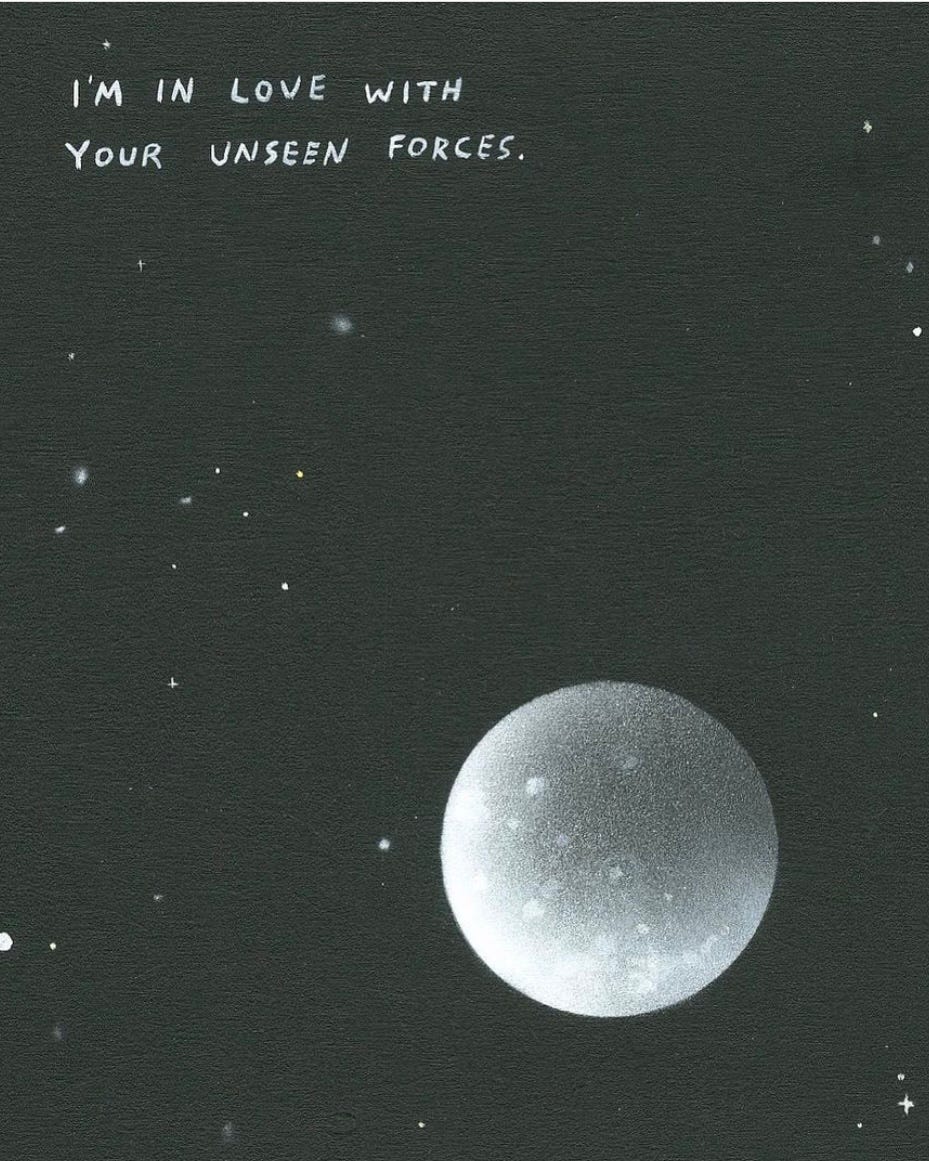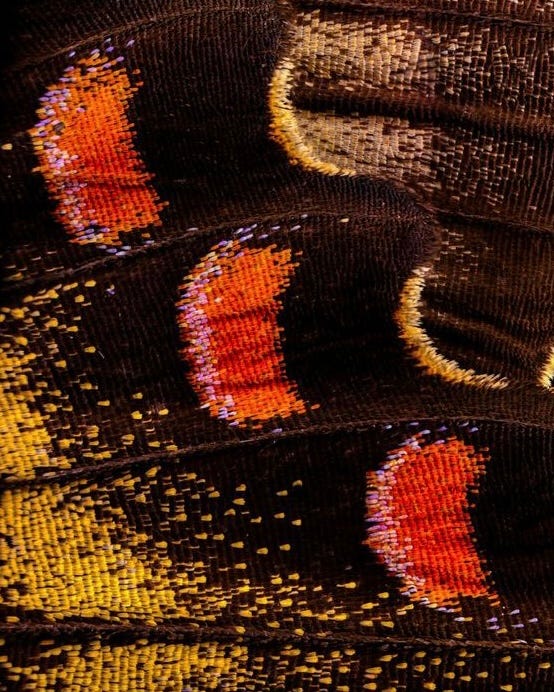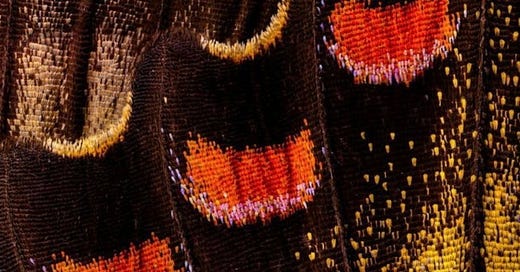If you’d like to listen to this piece, press play above! VO is normally for paid subscribers, but since September is our chosen new year here at EV, this one’s a little celebratory extra for all. For more VO, the full archive, exercises, and extra perks, upgrade to paid!
In the first invitation to our current theme of trust, I invited you to try taking a break from taking advice, especially when going through change. But sometimes the change we’re going through is so significant that we find ourselves needing more than a little bit of quiet time.
Sometimes we need to hide.
I’ve been patiently waiting for the right time to revive this piece that I originally shared in the Ecstatic Voice journal back in 2022 before it turned into The Ecstatic Review, and the time has finally come! If you want to learn more about why I’m a fan of reviving past work, check out the intro to another revival: “The tricky part of arriving.”
This piece on hiding is one that I’ve had more people bring up to me in conversation than maybe anything else I’ve written, and in one way or another they’ve told me that it’s something they really needed to hear. I love hearing that, because it’s pretty much why I write everything I share, and also because this piece is something I wrote so that I could hear it, too.
Which is a good example of our fourth invitation to trust, I’ve got you: a reminder that we’re all in this together.
So without further ado, here’s “The life-changing magic of hiding,” written by me then, with a few updates from me now.
Hi from behind this hat!
It’s been a minute. OK, it’s been months.
Where have I been, you ask?

Hiding.
It sounds strange to say that, doesn’t it? Like, if someone asked you at a party where you’ve been for the last nine months and you said, “Oh, I’ve been hiding,” I think we both have a pretty clear picture of what that person’s face might look like.
Hiding doesn’t exactly have a glowing reputation in this Age of Sharing Everything. In fact, we tend to be really concerned about people who aren’t sharing things.
“If you didn’t post about it, did it actually happen?” is a half-joking but also totally serious question. And even though we all know that the answer is A. of course it did and B. there’s a good chance you enjoyed it even more because you weren’t trying to enjoy it while also making a video about it, choosing not to share can still be a tough concept to wrap our heads around.
Even tougher when there’s so much noise out there about how and why we should constantly share: content platforms promising more engagement the more you post, business coaches outlining the 10 Ways You’re Not Showing Up, self-described media experts urging you to join an upcoming visibility boot camp, which is an actual thing the algorithm recently served me.
“Visibility... boot camp?!?!” I shouted incredulously to my dog Rosie, then dove into a passionate monologue about how the last thing we need when encouraging the courageously vulnerable act of being seen is to sign up for something named after one of those places where rebellious youths are trained to behave.
As if to demonstrate the point of my rant while simultaneously escaping it, Rosie ran and hid under the bed.
Still, it might be a little strange to hear me say that I’ve been purposely hiding. Me, whose work is all about sharing your voice, who talks all the time about how voice and visibility go hand in hand.
“To share your voice is to show yourself: to take what is inside of you and express it outwardly,” I wrote in the first Ecstatic Review.
Which is true. What’s also true is that hiding is an essential part of being seen.

Let’s talk about hiding, shall we? It’s one of those words that gets a bad rap, because it so often comes with the assumption that you’re hiding from something or for some reason that you’re doing nothing, when the opposite is usually true.
The word hiding simply means “to keep out of sight,” often from a place of protection. There are many kinds of hiding, and I don’t think that any of them are necessarily bad. Sure, we might hide out of resistance or fear when it’s our time to be seen in the world, but even those kinds of hiding are opportunities to be brave and get to know ourselves better—to learn more about how we operate and why, so that we can understand what we need to be more visible in the world.
The kind of hiding I’ve been up to lately is one that I don’t think is talked about enough or quite frankly celebrated enough for its vital role in self-expression, and in any change that’s identity deep.
It usually shows up as a period of time in which you’re not actively giving updates on what’s going on with you because you’re more interested in understanding what’s going on with you. It’s the kind of hiding that you do on purpose as you prepare to be seen in a newer, fuller, and often bigger way.

Hiding on purpose? Cue the sound of a million social media executives shuddering. But whether they like it or not, this kind of hiding is something we will do over and over again throughout the course of an ever-evolving life. It’s an essential part of every creative process, and of every life cycle in nature—perhaps most famously demonstrated by the masters of transformation themselves: butterflies.
Whether it’s been a minute since you’ve read up on metamorphosis or you feel like you already know what it’s all about, the absolute bonkers mechanics are worth a quick refresh:
In order for caterpillars to become butterflies, they create a protective chrysalis around themselves. This is often described as the cocoon phase, but I’ve started calling it the chrysalis phase when it shows up in my life—because a chrysalis is specific to butterflies, and because it comes from the Greek word khrusos, which means gold.
OK, back to metamorphosis: Inside the dark safety of the chrysalis, caterpillars fully disintegrate on a cellular level and then reconstitute themselves into a brand-new form with the addition of wings. Wings that are as functional as they are prismatic.
Because nature is wild and astonishing, let me recap:
Within a safe place to hide, a place of its own making, a caterpillar breaks down its previous self in order to become a renewed version that is made to fly out into the world. From the outside, it looks like nothing is going on. Inside, everything is changing. And not just changing: transforming with the intention of greater visibility.

Plants have their version of this, when they quietly grow roots in the shelter of the soil before blooming above the surface. The world has its version, when it gets dark every night before the sun rises again. And we have ours, when we develop in the safety of our mother’s womb before we’re born. And when we write before publishing, rehearse before the show opens, make a thing before marketing it, take a break from social media, go on long walks, stay in bed, watch things that let our minds relax, and give ourselves time and space to figure out who we are in this moment of our lives before sharing it with everybody else.
To hide in order to become something new is not only natural; it’s necessary. The desire to say “Hold please!” is often a sign that it’s time to do exactly that: to hold and support the full development of something—a project, an idea, a renewed version of you.
My recent hiding has been all about holding and supporting the full development of Ecstatic Voice. When I needed to open up a waitlist a couple of months after I began sharing my work more widely, I pressed pause on spreading the word and focused instead on creating a sound and supportive foundation for growth.
I looked closely at every success story to understand why this process works. I put new systems and workflows in place. I completed an accelerated MBA program to strengthen my business muscles. I asked for help from lawyers, accountants, and coaches, and bounced ideas off of colleagues and peers.
Meanwhile, I went on a lot of walks. I put my phone on Do Not Disturb for most of many weekends, which I spent seemingly doing nothing other than cleaning my house (one of my favorite ways to think). I took all of that good advice and put it in a place where I knew I could return to it whenever I needed it. And then I listened as closely as I could to what felt right for me, while getting to know the version of myself that this new phase of growth was asking me to be.

When you decide to spend some time in a chrysalis of your own making, you get to enjoy the deeply personal experience of meeting the new version of yourself that’s emerging—and often with it, a new extension of yourself in the form of a creative project, career change, business shift, or something else—before anyone else does. You get to understand and trust your logic without having to explain it or prove it to other people first, or defer to voices louder than your own.
And if and when you’re ready to share, you get to do so in your own time and on your own terms.
It’s okay if to everyone else it looks like nothing is happening. You know that actually everything is happening: you’re rearranging things, gaining a deeper understanding, strengthening your self-trust, creating something new.
So how do you know when it’s time to re-emerge? For me, it’s a feeling more than a thought. It literally feels like my metaphorical wings are beating against the walls of myself: the new understanding has brought in a new urgency, a need to be in the world in this renewed expression of myself and my work.
That or my rent is due. Whichever comes first.
It’s important to note that re-emergence is usually clunky and awkward at the start, and there’s almost always a desire to hide a little bit longer. That’s all part of it. It takes butterflies time to figure out how to operate their wings, and so it might take you a second, too.
But you will. As you ease back in step by step, you’ll be flying before you know it.
See you when I see you,
P.S. For more support and encouragement on trusting your intuitive logic:









"To hide in order to become something new is not only natural; it’s necessary." You have no idea how much permission you give all of us to just be ourselves. Thank you, Cate! P.S. As an OG podcast listener of yours, LOVED hearing your voice on this :)
On my third reading of this essay, the idea of a 'hide' for birdwatchers, and the words 'hiding in plain sight' came to mind. Instead of a sabbatical (not currently possible) I thought that perhaps, within my busy days, I'm able to cultivate a part of me that sits quietly in a 'bird hide' to watch, listen for and take fascinated (non-judgemental) note of my patterns, slowly assembling a more coherent, integrated, thorough expression of what I'd like to say. Perhaps, instead of 'writing in my journal', I should think of it as 'taking field notes'. And maybe I should wear a pith helmet while doing it.